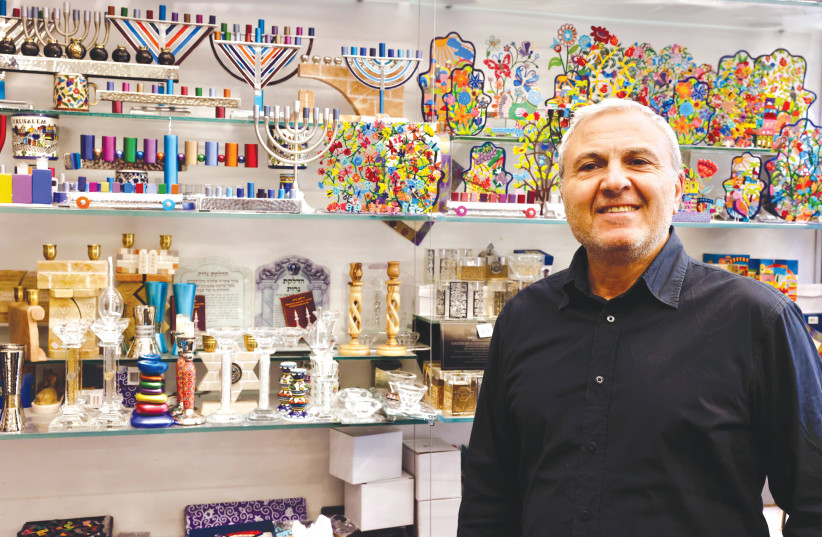In his small downtown kiosk on Jerusalem’s Ben Hillel Street, shop owner David Cohen sells a pack of cigarettes to a customer with long, dark, tightly curled pe’ot (sidelocks).
Then he chats amicably with a woman wearing a long skirt and a fashionable hat as he prepares a coffee for her from a Nespresso coffee machine. She speaks Hebrew with a slight Russian accent.
Another costumer squeezes his way into the small space, using a white guide cane for the blind. Cohen greets him by first name and tells him to go sit down outside and he will bring him his usual coffee.
“I give service to everyone,” said Cohen, who categorizes himself as secular but politically right-wing. “This [coalition agreement amendment] is not acceptable. It is like going back to the Dark Ages. It is racist.”
Cohen was referring to the amendment in the coalition agreements between the Religious Zionist Party and United Torah Judaism and the Likud which would revoke the law that prohibits discrimination, and would enable private businesses to refuse to provide a product or service due to religious belief, if the same product or service could be obtained in near proximity and at a similar price.


Earlier in the week, two members of the newly created government coalition, RZP MKs Orit Struck and Simcha Rothman, caused a stir when they said in media interviews that the amendment would allow businesses, hotel owners and even doctors not to serve people if it is against their religious beliefs.
Struck said she would work to change antidiscrimination laws to permit, for example, individual doctors to refuse to treat LGBT patients, or a man or woman to refuse to serve a member of the opposite sex, or to provide service to women deemed to be dressed immodestly. Both MKs retreated from their statements later in the day and said they had been taken out of context and blown out of proportion by the media.
The clause in question in the UTJ text says: “in order to anchor what was practiced for dozens of years and in order to fix a distortion of the status quo which was made recently,” the law that bars discrimination in products, services and entry into public spaces on the basis of gender, ethnicity, etc. would be amended so that holding gender-segregated [events] due to religious belief will not be considered illegal discrimination.
The law will also be amended so that a private business may refuse to provide a product or service due to religious belief, on the condition that a similar product or service can be found in near proximity for a similar price.
“There is no end to it,” said Cohen, who voted for the Itamar Ben Gvir-Bezalel Smotrich unified list in the last elections. “It can start with homosexuals, then Arabs, then ultra-Orthodox, Ethiopians, someone who is not wearing the proper clothing. They want to separate minority segments of the population from the majority. This is something an extremist government would do.”
Voters wanted a strong police force, reform in the Supreme Court and a “stop to Sudanese” coming to Israel, said Cohen – not visits to the Temple Mount and discriminatory legal agreements.
“If they continue with this, I won’t vote for them next time. People won’t vote for them, and they will find themselves outside,” he warned.


PRIME MINISTER Benjamin Netanyahu swore in his coalition of far-right and ultra-Orthodox parties on Thursday, put together after more than a month of negotiations which resulted in a carving out of contentious new ministerial roles for controversial members of the coalition.
Interestingly enough, the new appointments included the voting in of openly gay Likud MK Amir Ohana as the next Knesset speaker.
Netanyahu speaking out
Netanyahu spoke out against Struck’s and Rothman’s interpretations of the agreement, saying: “MK Orit Struck’s comments are unacceptable to members of the Likud... the coalition agreements do not enable discrimination against LGBT people or harm their rights to receive services like every citizen in Israel. The Likud will ensure that there will be no harm to LGBT people or any Israeli citizen.”
In an opinion piece Haaretz’s Aluf Benn suggested that Netanyahu was using the agreement as a way to position himself to nonreligious Israelis as the only one who can save them from the radicals, in order to force the criminal trial against him to be halted.
President Isaac Herzog also responded, condemning the statements in a Twitter response. Members of the previous government and leaders of civilian organizations – including former prime minister Yair Lapid, former health minister Nitzan Horowitz, former transportation minister Merav Michaeli, Prof. Eyal Shwartzberger, CEO of the Pharmaceutical Society of Israel; Prof. Zion Hagay, CEO of the Israel Medical Association; Dr. Ze’ev Feldman, deputy CEO of the IMA and head of its branch of doctors working in the public sector; Hila Peer, chairwoman of The Aguda – the Association for LGBTQ Equality in Israel; and Hadas Ziv, vice president for content and ethics at Physicians for Human Rights-Israel – also all condemned the comments.
Michaeli wrote on Twitter: “Struck and Rothman are accurately articulating the new government’s guidelines, no matter how much Netanyahu outwardly disavows them. He is the secular minority in this extreme government where women, the LGBTQ community and Arabs are not recognized as equal human beings; a government that does not represent the majority of Israelis, who really do not agree with this.”


Several leading Israeli businesses, including Israel Discount Bank and the cybersecurity firm Wiz, pledged on Monday to strengthen their internal antidiscrimination rules and said they would not do business with groups that discriminate, following the remarks seen as undermining gender equality and minority rights.
“Struck and Rothman are accurately articulating the new government’s guidelines, no matter how much Netanyahu outwardly disavows them. He is the secular minority in this extreme government where women, the LGBTQ community and Arabs are not recognized as equal human beings; a government that does not represent the majority of Israelis, who really do not agree with this.”
Merav Michaeli
In response to the comments, the staff of Haifa’s Rambam Health Care Campus posted a tongue-in-cheek video on Facebook with staff members each mockingly saying they would treat only blonds or tall people, or people who wear glasses, declaring at the end: “People, we stop here. We treat every human being.”
AT LEAST in downtown Jerusalem, both secular and religious business owners expressed shock and dismay at the agreement and the statements by the MKs.
“I am religious and we have never heard of such a thing in Judaism,” noted Jan-Elazar Refua, the owner of the Ora Jerusalem Judaica shop on Ben Hillel Street. “In Judaism it says: ‘Love your neighbor as you love thyself.’ I don’t know what they are thinking.”
It is inconceivable, he said, that he would not give service to someone because they are in a wheelchair or are Arab. It is not his place to tell someone how to dress or to make decisions for other people, he added.
David Zakaeim, who owns a flower shop on Jerusalem’s Ben-Yehuda pedestrian mall and described himself as traditional, said that while he may not agree or like the LGBT lifestyle, and is against Jerusalem’s gay pride parade, he would never consider denying customers service because they are gay.
“I don’t support gays and lesbians, but what do I care if they come to buy something from me?” he said. “I have no idea what the intention of this agreement is or if it will actually pass. What does religion have to do with business?”
Attorney Itzhak Dessie said that as a member of a minority group that has suffered chronic discrimination, he is greatly concerned about the reported coalition agreement and the possible ramifications.
“I am very worried, especially as someone who belongs to a minority group which has suffered chronic discrimination. A law shouldn’t give power to the strong to hurt the weak,” said Dessie, a PhD candidate at the Faculty of Law at Bar-Ilan University, where he is the founder of the Legal Clinic for the Advancement of Equality and serves as academic supervisor. “We can’t backtrack on a 23-year-old law. We are going through a moral crisis, especially since the Jewish people have suffered discrimination based on our religion.”
Dessie, who is also the founder of the nonprofit Tebeka – Advocacy for Equality and Justice for Ethiopian Israelis and a Neubauer research associate at the Institute for National Security Studies focusing on structural inequality, said human rights should be defended by all political parties whether they are on the Left or on the Right.
“This is not an issue of security but how [they] go about hurting a minority group,” he said. “There are so many issues they could try to advance, and if the main thing the coalition is interested in is how to deprive fundamental and human minority rights, it is very grave.”
Despite the government’s declaration that it will protect all people, the agreement would be doing the opposite, he said.
The antidiscrimination law, which was intended to stop private entities that offer a service to the general public from discriminating against minority groups based on nationality, race, religion, gender or sexual orientation, was not passed by coincidence in 2000, Dessie said.
“It was passed because there were members of minority groups who suffered from discrimination against them,” he said, citing the example of the Barkan Winery which in 2018 banned employees of Ethiopian descent from coming into contact with wine, to comply with strict kashrut license requirements, casting doubt on their Jewishness. “The law is meant to prevent discrimination of minorities that suffer from discrimination, so that minorities such as Ethiopians and members of the LGBT community receive equal service in all public places.”
Similarly, he said the Equal Employment Opportunity Law, which prohibited discrimination based on group affiliation in the workplace, was passed in 1988 because members of groups, including women, were being discriminated against.
Dessie noted that while Israel does not have a formal constitution, it does have a set of Basic Laws, including the Basic-Law: Human Dignity and Liberty passed in 1992, which, among other things, states that every human being is entitled to the protection of his dignity.
“According to the Supreme Court’s ruling, group-based discrimination is degrading and deprives the autonomy of the individual and therefore violates the right to human dignity. The duty to protect the right to dignity imposed on the legislative, executive, and judiciary branches is to take appropriate positive measures,” Dessie said.
While the legislator’s duty includes enacting antidiscrimination laws, the Supreme Court’s duty is to guarantee that both the legislature and the executive branches meet their duty, he added.
“It may be impractical to force the legislator to enact new laws, but where antidiscrimination law already exists, the Supreme Court has the power to rule and declare that the new law is unconstitutional, unless the new law is intended for a worthy cause,” he said. “In our case, since it seems that the entire purpose of the new law is to deprive the rights of minority group members to dignity on the one hand, while protecting service providers who discriminate against minority groups by intention on the other hand, it cannot be considered a worthy cause.”
Therefore, he said, he expects the Supreme Court to be “brave” and have the courage to protect the rights of minority group members and to “not give in to the threats of the members of the Knesset.
“Of course, the Supreme Court can’t force the Knesset not to pass a law, but it has the power to declare the new law unconstitutional and to order the nullification of the law,” he said. “There are extremist ideas on both the Right and the Left, but the prime minister has the responsibility [to rein those in]. We have to remember we are a Jewish state and a democratic state.”
AT THE Galeriya Rimon Judaica shop on Jerusalem’s Ben-Yehuda pedestrian mall, saleswoman Saraleh Partouche, who described herself as ultra-Orthodox, expressed shock at the agreement and said it could lead to possible discrimination.
“I think it is a disaster and absolutely unfair,” she said. “How can you refuse someone service? I don’t have to like someone’s [lifestyle], but I can’t stop being polite to the other person. I don’t have to go home with them. It is shocking.”
Along Jerusalem’s seam between downtown and the ultra-Orthodox Mea She’arim neighborhood, ultra-Orthodox Judaica shop owner Natanel – who asked that his last name not be used – methodically threaded the leather straps of tefillin, or phylacteries, inside one another so they could be put away in their cases.
“I have customers from all different parts of the world,” he said. “Once a woman came here after working out in her sports clothes and wanted to buy a mezuzah. I don’t care. A Jew is a Jew. I don’t judge a person by how he looks.”
Other merchants nearby declined to be interviewed but said they were against the proposals of the agreement, though they blamed the media and leftists for blowing things out of proportion.
“Politics is politics,” shrugged Natanel. But everyone who comes into his shop and wants to buy a mezuzah, tefillin or a tallit will get the same service, he said. “If a person wants to do a mitzvah, I won’t come and ask them who, what or how.”
Eliav Breuer contributed to this report.
![SARALEH PARTOUCHE: I don’t have to like someone’s [lifestyle], but I can’t stop being polite to the other person. I don’t have to go home with them. It is shocking. SARALEH PARTOUCHE: I don’t have to like someone’s [lifestyle], but I can’t stop being polite to the other person. I don’t have to go home with them. It is shocking. (photo credit: MARC ISRAEL SELLEM/THE JERUSALEM POST)](https://images.jpost.com/image/upload/q_auto/c_fill,g_faces:center,h_537,w_822/522746)